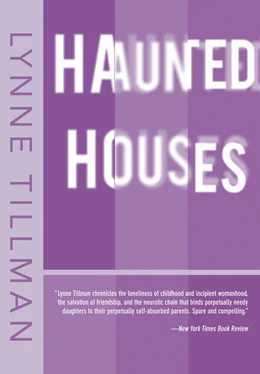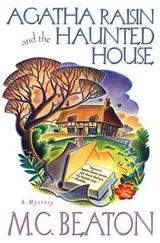As for Edith, it was Sunday, and on Sunday she did not want to think about her children and their feelings. She wanted to read The New York Times and make herself a sandwich. That night Christine’s mother called her daughter. She called faithfully every Sunday. “Your father left me nothing. I’ll have to work for the rest of my life in a dentist’s office,” recited tonight exactly as it had been done over the years, and responded to by Christine with the same precision. Mixed with the complaints was a sense of the absurd, the absurdity of their situation, mother and daughter, together, against the world, a sensibility that Christine comprehended and inherited, so to speak, rather than money.
Emily never worried about money; they had always had enough and her father wasn’t dead. It irritated but also pleased Christine to be close with someone who didn’t care night and day, day and night, about how she was going to survive. Emily never seemed to think about it. She’s not very realistic, thought Christine, who was herself practical and wary, not the optimist Emily was, not by a long shot. She explained to Emily that she had become a fatalist at an early age. But somewhere Christine comforted herself with the belief that life, like the end of a fairy tale, would present her with a happy ending, a man to support her. It was a belief deep inside her, but being practical she set about to become financially independent. The fantasy was a bas-relief, lifting her slightly above everyday exigencies. It was another thing that Emily didn’t really understand about Christine, this dread of poverty, fueling her friend into action more often than Emily would ever realize.
Still later, Edith read into the night, restless with denial; Christine decided again never to see Peter; and, having buried her mother’s phone call into ground that is not conscious, Emily worked on a poem that began:
Leo strides in a field of men
like a motorcycle passing cars.
She is too different to be used yet.
The cat wears its coat
mindless of any beauty
because beauty is only a word.
Tired and not tired, Emily stopped writing and placed the piece of paper in the drawer, turned off the light, and stared ahead into the dark space that was not completely black. There was light coming from a small window in her bathroom. She always kept the bathroom door open, to let that little bit of light in.
“You shouldn’t listen to your sisters, Jane, they overpower you.” The woman who said this was undressing as she spoke. She was showing the younger woman how to undress on the beach, European style. “You hold your towel like this, then you quietly tug at your pants.” Jane wanted to say that she was never even able to open The New York Times the right way on the train, but skipped it, thinking the Hungarian woman wouldn’t get it, and said instead, “I didn’t bring my bathing suit anyway.” She was back up the scale again. She would never get undressed on the beach, but she didn’t tell Sinuway that.
They had taken the subway to a Brooklyn beach that Sinuway went to often. The Hungarian woman had had a sister who died during the 1956 uprising. She told Jane, “You are lovely too, so was my sister, exquisite,” then gave Jane a small round mirror with odd markings on the back which she said Jane was to look into to know that she was a fine woman. Jane thought Sinuway was talking out of a novel. She had, though, gotten all her clothes off without any skin showing. The older woman said many things that the younger one listened to but would not hear until years later, and then like an echo.
Sinuway had wild, coarse red hair, perhaps all her features were coarse, and to Jane she was both plain and exotic, living in a tiny apartment on St. Mark’s Place, speaking from experience about the world. She said she was going to marry a professor but Jane never met him. It was conceivable that he didn’t exist, or that he was part of Sinuway’s book, or her mind, so foreign to Jane.
Despite the meaning of her name, “one who walks alone,” Sinuway gathered people to her. Besides Jane there was Carl and occasionally Jimmy, Jane’s childhood love. Carl lived across the street from Sinuway and was crippled. He had an angel’s face, thin and dark, like a study by Leonardo, Sinuway would say, and his legs dragged behind him. Jane wanted to be in love with Carl because he was crippled; she wanted to be able to be in love with him, but she wasn’t.
Jane passed time with the Hungarian woman and Carl. “Let’s go to a castle,” Sinuway exclaimed. “Where?” “In New Jersey.” “There’s a castle in New Jersey?” “Would I say let’s go to a castle if there wasn’t a castle? Are you thinking I’m crazy, Jane?” Jane was always thinking everyone was crazy. “No, let’s go. What do you think, Carl?” Carl had a small white car specially built for him. The three of them just fit into it, Jane sitting on the ledge, Sinuway getting the guest of honor’s seat, as she called it, “because I’m the oldest.” As the youngest in her family, Jane never expected to become the oldest anywhere. “You have much to learn, little one,” Sinuway said, annoying Jane. Still, when Sinuway spoke in her accented English, every syllable had more meaning.
There’s a castle in New Jersey. The three arrived there late one evening. A wealthy American in the beginning of this century, Sinuway reported, had a Scottish castle shipped to New Jersey, stone by stone. “Americans want to be cultured so they bring Europe here, by boat,” she said. They walked from room to room. The air inside was damp, and Jane can’t remember how they got in, although she is almost positive it was entirely legal. Sinuway must have known someone. All three of them felt awkward in the castle, riding to it had been more fun.
Later, in the car, Sinuway talked more about transplanting cultures, which sounded to Jane like discussing a yeast infection. “I myself am a transplant,” Sinuway said. “I will never fit here, in America. It is not possible.” Jane came to believe that what Sinuway said was something akin to Hungarian folk philosophy, none of which she could repeat word for word, the words being spoken huskily into the wind as they drove back to Manhattan, or as they sat in a small room. “There is a castle in Spoleto called La Rocca,” she told Carl and Jane, “that was started in the fourteenth century and finished in the middle of the fifteenth by Pope Nicholas the Fifth. It was used as the residence for papal governors. But today it is a prison. So you see it is crazy to transplant things because there is a place for them and that place changes but people don’t know that if they are not there and they worship the wrong things. Who cares about an old castle?” Sinuway looked at Carl, who said, “It was your idea to come here.” “Yes, I know,” she said, “I wanted you to see it for yourself.” Even the way Sinuway said “see” was different. It sounded like what it meant. “And where is Jimmy tonight?” she asked Jane. “I don’t know,” Jane answered, thinking he’s probably getting high somewhere in the city.
Somewhere in the city Jimmy was taking some grass out of a child’s plastic beach pail that was kept under his dealer and friend’s couch. He started laughing and laughing, his crooked teeth set so strangely in his mouth, sticking out like tiny marshmallows, or so they looked to his friend. “Your teeth look ugly enough to eat, man,” his friend said. “Where’s your suburban girlfriend on a wet night like this?” Jimmy breathed in and out and felt his heart which was still beating. “How would I know. And she’s not my girlfriend,” Jimmy said. “She’s a pain in the ass.” “She’s great, Jimmy,” his friend laughed. “A little on the naive side. But she’s great.” “She’s all right. She got a little too much when she was taking speed,” Jimmy yawned. “Now she’s just a little too much on the weight side.” “Maybe she’s always too much,” his friend said. “Not for me,” Jimmy said, not thinking it over.
Читать дальше












